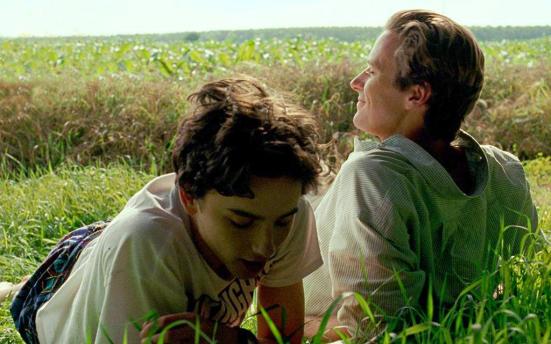Sometimes when I watch a film – a film that everyone is hailing as a masterpiece, the best of the year, a sure-fire Oscar contender – I wonder if I’m missing something. That’s how I felt watching Call Me by Your Name, a film that everyone seems excited about – and while I enjoyed it, I did think to myself, “is that it?” I was expecting this searing, erotically-charged love story, and I got it to some extent, but there was also the problem of the bits in between.

Directed by Luca Guadagnino (who will be remaking Argento’s Suspiria next), Call Me by Your Name is the story of Elio, played by Timothée Chalamet: a 17-year-old boy who falls in love with his parent’s lodger over a beautiful summer in northern Italy. Said lodger is Oliver, a 24-year-old student of Elio’s father and played by the internet’s new boyfriend Armie Hammer.
Over six sun-kissed weeks Elio and Oliver pursue each other through a mixture of loaded glances, musical playacting (Elio is a prodigy on the piano and his father wants everyone to hear him play) and prickly small talk. The way both characters dance around each other, sometimes literally, makes for some palpable romantic and sexual tension, and Guadagnino has great fun when visually showing the distance between them getting shorter and shorter.

Timothée Chalamet as Elio is fantastic, embodying a 17-year-old boy still trying to discover what it means to be a man. It’s true that I got a little pissy when he frequently looks bored even though he can read whenever he wants and judging by the size of his parent’s library, whatever, and does so against the staggering backdrop of North fucking Italy, but that’s my issue (Roger Ebert felt the same when the characters from the Noah Baumbach’s Squid and the Whale complained about talking about Dickens at the dinner table, so, I’m basically Roger Ebert now).
Blatant self-delusion aside, Chalamet gives Elio a relatable intensity and petulance of someone who, despite being clever, popular with the ladies, and able to take the piss with classics on the piano, still feels uncomfortable in his own skin. It’s through his budding relationship with Oliver that he feels like the person he wants to be, something that is incredibly common in relationships with that kind of age gap.

Armie Hammer is slick and stylish as Oliver, a man who effortlessly commands the attention in any room he walks into. His confidence and self-possession are what makes him so attractive to Elio (the fact that he looks like Armie Hammer will help too), but there is a subtle conflict to every action he takes concerning his young lover. The location of Italy re-contextualises Oliver and Elio’s relationship. If the same thing were happening in their native America, Oliver believes his father would cart him off to a penitentiary. Most reviews of Call Me by Your Name don’t mention this aspect of the film at all, but it does bring a crucial ambiguity to Oliver’s actions as his advanced age gives him much the power here. The film seems to be tangentially aware of this difference in context – indeed, that might be why the novel it was based on was set in Europe rather than the US.
But this is still a fundamentally flawed movie. Whearas the slow pace is supposed to give depth to their growing infatuation leaves the eventual culmination of their relationship coming too late into the movie, and large swathes of the film are actively boring; despite the great camerawork, setting, and acting, the film is too slow at times, and this is from the guy who happily watched two and a half hours of Ryan Gosling slowly walking towards things in Bladerunner 2049. It’s a long movie that often tips over into self-indulgence, and fails to capture the crackling, unputdownable tension and effects of repression of recent LGBT breakthroughs like Moonlight and Carol.
In spite of these misgivings, the film does have two breath-taking tricks up its sleeve: Michael Stuhlbarg’s cathartic final scene (which he may never better) followed by one of the most sensitive and emotionally intuitive endings ever captured on film, all in the last ten minutes – which, despite it’s problems, is almost reason enough to give Call Me by Your Name a shot.
By Kevin Boyle
If you enjoyed this article and want to see more stuff like it, take a look at the rest of our Best Picture nominee reviews in our Oscar season tag and please consider supporting us on Patreon!

Interesting, thoughtful review. You give an idea of the film without giving too much away.
Thanks for sharing.
LikeLike
Thanks for reading!
LikeLike
Reblogged this on The Cutprice Guignol.
LikeLike
Even though I loved this movie like the dickens (I watched it for the second time this evening) and it has made me read the book for a second time, I don’t think your review is invalid. This movie was helped by really phenomenal songs that have not stopped singing in my head and making tears spring in my eyes. After my second viewing, though, I think may favorite movie about summers in the Mediterranean countries where the cicadas are very loud (I’ve decided that is actually a “genre”) is the combination “My Father’s Glory/My Mother’s Castle”, very different from “Call Me By Your Name”, and yet “Call Me By Your Name” really kept wistfully reminding me of the Marcel Pagnol movies.
LikeLike